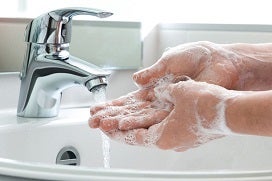
Researchers found that the act of cleaning one’s hands led participants to shift goal pursuit, making prior goals less important and subsequent goals more important. (Alexander Raths/Dreamstime)
A new study from two researchers at the University of Toronto has found that hand wipes may do more than clean dirt off people’s hands.
Over the course of four experiments, researchers found that the act of cleaning one’s hands led participants to shift goal pursuit, making prior goals less important and subsequent goals more important.
“People have multiple goals to pursue in their life and sometimes some of the goals may be fruitless,” Ping Dong, a co-author of the study, said. “But people often feel it’s hard to give up old goals and pick up new goals so maybe physical cleansing can help people shift their goal pursuits effectively.”
The study, conducted by Dong, a PhD student in marketing, and Spike W.S. Lee, an assistant professor of marketing, was published in the Journal of Experimental Psychology: General.
Groups of undergraduate students, ranging from 103 to 242 participants, were asked to complete word games or a short survey to bring their attention to particular goals, a process called “priming.” The groups were divided into two categories, those who then used a hand wipe and those who simply evaluated one.
After using the hand wipe, members of that group were less likely to think about the previously primed goal, act in a way that was consistent with that goal, and find the previously primed goal important. If a goal was primed after cleansing, however, its importance was amplified.
Research into the psychological effects of cleansing is not new. There have been a number of previous studies on the subject, finding that it influences guilt from immoral behaviour and dissonance from free choice. But this study examines the underlying mental process, arguing that cleansing functions as a procedure of psychological separation. Removing dirt from one’s hands works to dissociate prior experience from the present self, the study claims.
“We are not the first to study these kinds of things,” Dong said. “But if you understand the mechanism, we can predict more effects of physical cleansing or other ways of manipulating or activating this psychological separation.”
Simone Schnall, director of studies in Psychology at Jesus College, Cambridge University, said the connection between cleanliness and the moral domain has received “considerable support” with a growing amount of literature.
“But this new paper points to a more general role of cleanliness, a ‘clean slate’ effect that goes well beyond morality,” she said. “It's important in the sense that it shows that physical cleansing can serve as a ‘psychological reset button’, as it were, that operates on a very general level.”
Schnall, who wrote a paper in 2008 titled “With a clean conscience: Cleanliness reduces the severity of moral judgments,” said she believes the findings were reasonable as the experiments “were very carefully conducted and provide compelling support for the idea that cleanliness acts to separate different types of mental content.”
Christine Purdon, a professor in the Psychology department at the University of Waterloo who studies the persistence of compulsive behaviour, such as hand washing, said the findings are “interesting.”
“We have begun to explore the actual goals people with obsessive-compulsive disorder (OCD) have in mind when they complete their compulsive act and to consider goal prioritization as a potential target in treatment,” Purdon said. “This study introduces the possibility that compulsions work when they are successful in ‘de-priming’ the goal that evoked them.”
However, Dong said the study does have some limitations, including their use of only undergraduate students as participants, rather than the general public, and the short-term nature of the experiments.
“We cleaned their hands and then immediately asked how important goals were so we ideally could run some experiments with some longer delays, half an hour or one day, to see if the effect of cleansing has any long term effects on goal pursuit,” she said.
Purdon pointed out that behavioural research is very controlled, therefore it “may lack ecological validity.” She also noted that the researchers primed specific goals that “may or may not be goals that are current and central for participants.”